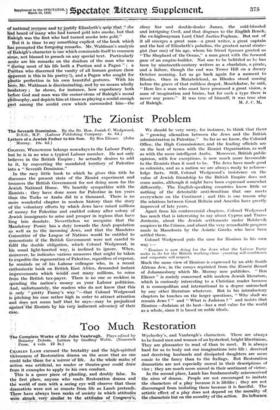The Zionist Problem The Seventh Dominion. By the Rt. Hon.
Josiah C. Wedgwood,
D.S.O., M.P. (Labour Publishing Company. 4s. 6d.) '
Letters of a Jewish Father to his Son. By Ben Eliezer. (John Murray. 10s. 6d.) CorpNar. WEDGWOOD belongs nowadays to the Labour Party,
but he is in no wise a typical Labour member. He not only believes in the British Empire ; he 'actually desires to add to . it, by converting the mandated_ territory of Palestine into a " Seventh: Doniinion."
In the racy little book to which he gives this title he discusses the, present state of the Zionist experiment and trounces the British Government for not doing more for the Jewish National Home. We heartily sympathize with the Zionists ; they have done more for Palestine in ten years than the Ttirks or Arabs did in a thousand. There is no more wonderful chapter in modern history than the story of the voluntary efforts by which Jews have raised millions of Money for Palestine and enabled colony after colony of Jewish immigrants to arise and prosper in regions that have l'Ong lain desolate. Nevertheless we recognize that the
Mandatory Power a duty towards the` Arab population ,
as well as to the incoming Jewi, and that the Mandates Committee of 'the -League "of Nations would -be' entitled to remonstrate if the British Government were not careful to fidfil the double obligation, which Colonel Wedgwood, in his usual light-hearted way, is inclined to ignore. When, moreover, he indicates various measures that might be taken to expedite the regeneration of Palestine, regardless of expense, lie reminds us of- his -Labour 'colleague who, in a recent enthusiastic book on British East Africa, demanded instant improvements which Would cost many millions, to mime frOni the British tax-payer. There is no one so reckless' in sianding the nation's money as your Labour politician. And, unfortunately, the readers who do not know that this is only " pretty Fanny's way "—that Colonel Wedgwood is pitching his case rather high in order to attract attention and does not mean half that he says—may be prejudiCed against'the Zionists -by his very indiscreet advocacY of their
•
We should be very sorry, for instance, to think that there is " growing alienation between the Jews and the British administration in Palestine." So far as we know, the Colonial Office, the High Commissioner, and the leading officials are on the best of terms with the Zionist Organization, as well as with the more intelligent Arabs. Moreover, British public opinion, with few exceptions, is now much more favourable to the Zionists than it used to be. The Jews have made good as colonists, and as a nation we are always ready to acknow- ledge facts. Still, Colonel Wedgwood's insistence on the value of Jewish friendship to the British Empire does not come amiss, although it might have been expressed somewhat differently. The English-speaking countries know little or nothing of the detestable anti-Semitism that one meets everywhere on the Continent ; and this is one reason why the relations between Great Britain and America have greatly improved of late years.
Apart from his controversial chapters, Colonel Wedgwood has much that is interesting to say about Cyprus and Trans- Jordania, about the Jewish settlements under Bolshevik auspices in the Crimea, and about the very remarkable progress made in Macedonia by the Asiatic Greeks who have been settled there.
Colonel Wedgwood puts the case for Zionism in his own way :-
"Zionism is now doing for the Jews what the Labour Party seeks to do for the British working-class—creating self-confidence and corporate self-respect.
Much the same view of Zionism is expressed by an able South African Jew, in the essays reprinted from the Zionist Record of Johannesburg which Mr. Murray now publishes. " Ben Eliezer" is mainly concerned with modern Jewish literature, which is curiously interesting to a Christian reader because it is cosmopolitan and international to a degree untouched by any other literature whatever. But in his introductory chapters he touches on the larger questions, " Why shall we remain Jews ? " and " What is Judaism ? " and insists that Zionism—Judaism at its best—has a real value for the world as a whole, since it is based on noble ideals.


























































 Previous page
Previous page